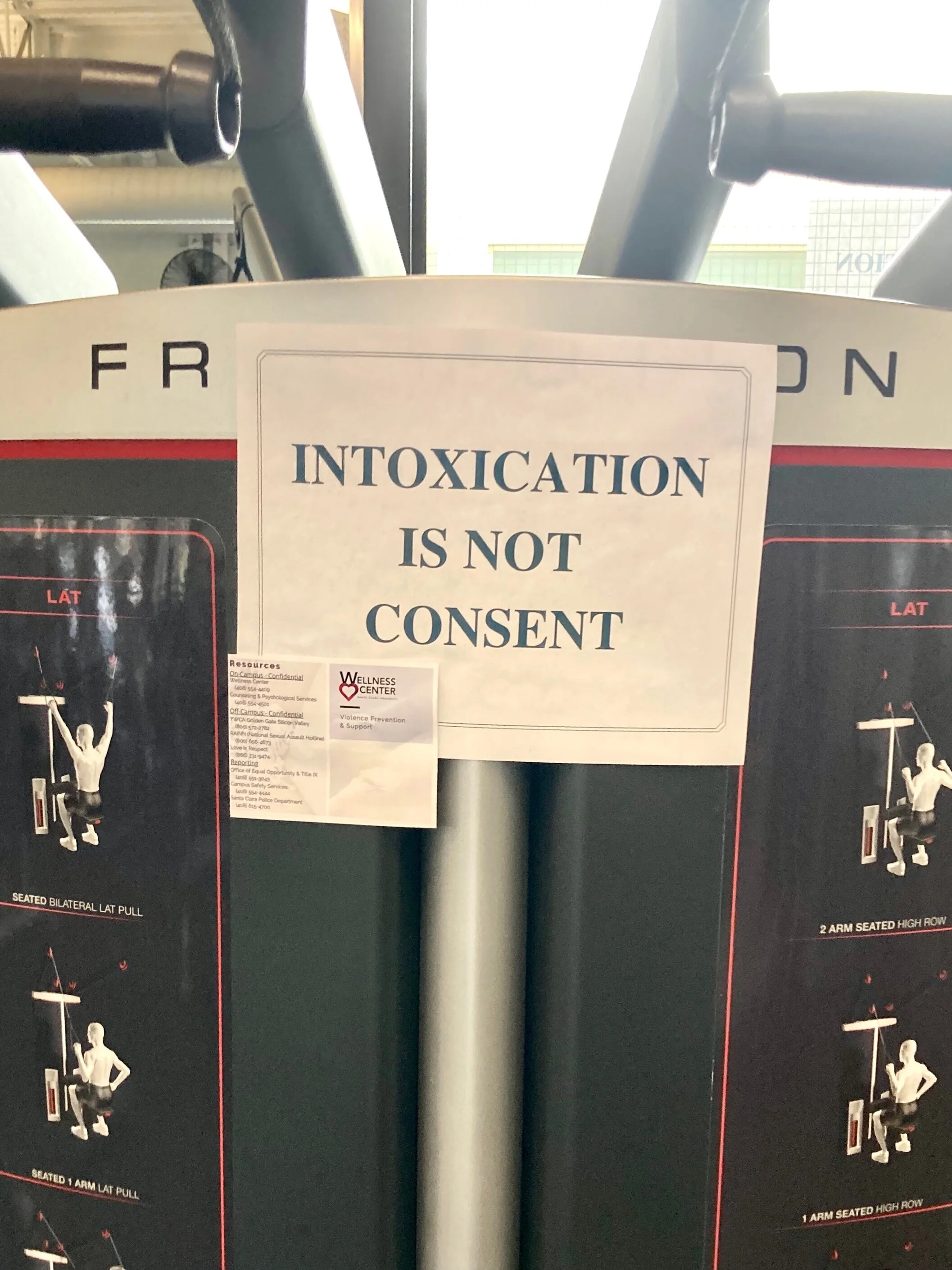ASG President Addresses Sexual Violence at Santa Clara
Flyers posted throughout campus in support of survivors were removed by the university
Student Body President Abigail Alvarez sent an email to the Santa Clara community on Sept. 23, addressing over 30 incidents of alleged sexual assault that had been reported to Greek life leaders during the first three days of school.
The reports, some of which referenced the use of date rape drugs, prompted Santa Clara’s Greek life leaders to hold an emergency meeting on Sept. 23, according to the letter. The organizations instituted a number of rules for fraternities hosting parties, including checking for access cards at the door, exclusively serving cans of sealed alcohol and requiring that bartenders be sober.
“To be clear, not all assaults involve members of Greek life, but leaders have decided to step up anyway and do what they can to prevent violence,” Alvarez wrote. “This list alone will not eliminate sexual assault at SCU, nor will it single-handedly uproot a deeply embedded and systemic rape culture, but it is one way that these groups want to take responsibility and promote community-level care.”
Following Alvarez’s message, Vice Provost for Student Life Jeanne Rosenberger and Title IX Director Belinda Guthrie sent an email to the student body on Friday evening, urging students to report incidents of sexual assault to the university.
According to Rosenberger and Guthrie’s email, Santa Clara “has received several third-party reports about three possible incidents of drugging and a sexual assault this past weekend.”
The email also links a list of resources and encourages students to contact Assistant Director for Student Survivor Advocacy and Campus Support Services Bree Van Ness for confidential support.
Acting President Lisa Kloppenberg shared on Tuesday that Guthrie, who led the creation of Santa Clara’s current hearing process, will be starting a new job at Vassar College in October. Guthrie will be assisting Santa Clara through January of next year. Title IX Investigator Jenna Elliot will assume her role in the interim.
The alleged incidents prompted a group of student activists, sexual assault survivors and faculty members to post hundreds of flyers on campus with phrases like, “trust women” and “intoxication is not consent.”
The group arrived on campus before 7 a.m. on Sept. 28 to post the flyers on residence hall elevators, corridors, benches and lecture hall bulletin boards.
Within 45 minutes, the flyers were removed from Benson Memorial Center. While the majority were removed from other spaces as well, some remain posted at press time in buildings like Vari Hall and Malley Center.
Assistant Vice Provost for Student Life Matt Cameron cited the university policy that requires flyers to be approved and stamped at the Information Desk before being posted.
He explained that all unauthorized posters get removed from Benson, and that the content of the flyers was not a factor in the building staff’s decision to remove them.
“[Sexual assault] is an undeniably important topic that needs to be addressed,” Cameron said. “We were just caught off guard this morning and did what we thought was appropriate given the information we had at the time.”
The swift removal prompted criticism from many students on social media.
Junior Clare MacMillin, one of the student organizers, posted an Instagram story of a Benson employee removing the flyers from an exterior Benson door with the caption, “Barely 8am and SCU is already taking down signs we put up in support of [sexual assault] survivors.”
The story was reposted by several students, as well as @metoo.scu, the official Instagram page of the #MeTooSCU movement.
MacMillin’s post continued with the caption, “@santaclarauniversity this is what y’all are JUMPING to tear down? We got a faster response from the school taking down these posters than we have about any labor policy or justice initiative.”
Alvarez, who organized the project and helped distribute the posters, explained that the goal was not for these flyers to become a permanent fixture. Rather, it was a form of disruptive activism.
“We knew [the flyers] were going to get taken down,” she said. “Obviously, we would have wanted them to stay up for longer, but the bad press that the people who took them down are getting is effective.”
Alvarez continued, “That guy was just doing his job, and it’s his job to maintain the building. It was just the sentiment of how quickly the university responded when it came to fixing their image, versus how slow they are to respond to actual, concrete demands, concerns and issues.”
Director of Recreation Janice DeMonsi decided to move the flyers off of Malley’s front door, but leave them in the facility. At press time, flyers are taped onto gym equipment, mirrors, and walls. Worried that they may be triggering for some students, DeMonsi taped a printed list of resources for survivors of sexual assault to many of the flyers.
Photo Credit: Krishna Bheda
“I think it’s important for [the flyers] to stay up,” DeMonsi said. “I do know that a lot of buildings didn’t do that, but I think it’s important for students to see.”
